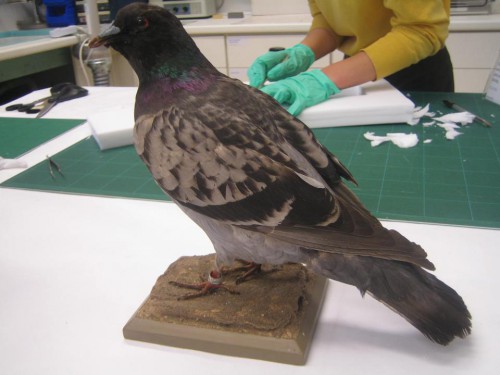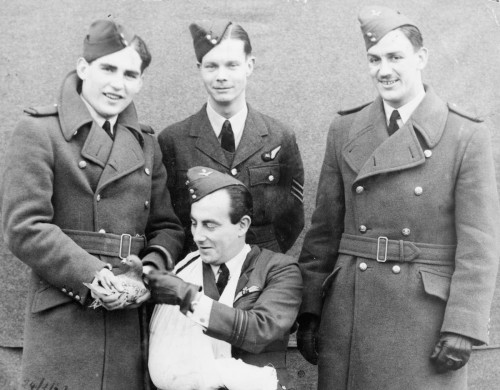A HEROIC pigeon which was decorated for saving the lives of a shot-down bomber crew is taking centre stage at an airbase’s centenary celebrations this year.
Winkie was carried on board the Fife-based aircraft and released when it ditched in the North Sea following a raid on Nazi-occupied Norway in February 1942.
Winkie flew 120 miles to its owner in Broughty Ferry, Dundee, who raised the alarm, sparking a successful mission to rescue the crew.

As a result, the bird became the first to earn the Dicken medal for bravery.
The hen was preserved after death and has been kept in Dundee’s McManus Art Gallery and Museum.
Now Winkie is being dusted off so her amazing story can be brought to a wider audience.
She will take pride of place at the 100th anniversary celebrations at nearby Montrose Air Station Heritage Centre in Angus, which in 1913 became the UK’s first operational air base.

Dr Dan Paton, curator of Montrose Air Station Heritage Centre, said: “During the Second World War, caged pigeons would often be carried in planes so they could fetch help if anything went wrong.
“Winkie was in a bomber flying from Leuchars when it was hit by enemy fire and went down in the North Sea.
“On release from her cage, Winkie flew to Broughty Ferry, where she raised the alarm and the crew were saved.
“In recognition of her bravery, Winkie was awarded the Dickin Medal and, after she died, her body was preserved so future generations would remember her.”
The Dicken medal was created to recognise the contribution of animals in war, and more recent recipients have included dogs who sniff out bombs in Afghanistan.
Winkie was awarded her medal in December 1943. She was reunited for a picture with the bomber crew, one of whom still had his arm in a sling from the crash.
Unfortunately, records of the crew’s identity appear to have been lost over the years.
The heritage centre also has a replica Sopwith Camel and a piece of the Red Barron’s Fokker triplane.
Fascinating
Alan Doe, chair of Montrose Air Station Heritage Centre, said: “This exhibition will provide a fascinating insight into the history of Montrose Air Station, Britain’s first operational military airfield”
“Montrose Air Station was set up by the Royal Flying Corps’ 2 Squadron in February 1913 and was one of the main training centres for Britain’s World War l and World War ll pilots, as well as being a major air station during both World Wars.
He continued: “Montrose Air Station played a highly-significant part in the history of flight and the First and Second World Wars but it was at risk of being forgotten.”
“However, thanks to the efforts of our dedicated team of volunteers Montrose Air Station Heritage Centre now tells the story of the base, the men and women who were stationed there and the aircraft that flew in the skies above Montrose when the station was operational.”
Montrose Air Station Centenary Exhibition will be formally opened on February 23 by the Provost of Angus, Mrs Helen Oswald.
